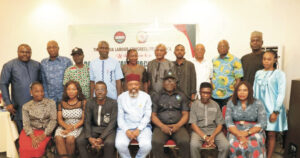Nigeria ratified its membership of the African Continental Free Trade Area Agreement (AfCFTA) in 2020. It has established the National Action Committee (NAC) on the AfCFTA to steer the implementation through an eight-pillar strategy to leverage the country’s competitive advantage. The Nigerian government has prepared its institutions to ensure successful participation in the trade areas most likely to benefit from the AfCFTA. Despite this progress, the Nigeria Labour Congress (NLC) is concerned about the poor representation of workers’ concerns and interests in these processes, given the potential impact of such large-scale trade liberalisation on its members.
Trade union participation in AfCFTA processes faces challenges such as limited resources and insufficient capacity. To address these obstacles, the NLC, with assistance from ITUC-Africa and the Labour Research Service, is enhancing the capabilities of its affiliates to engage with the AfCFTA and to ensure that labour and the creation of decent work are integral parts of the implementation processes.
At a recent NLC AfCFTA workshop in Abuja, General Secretary Emmanuel Ugboaja highlighted workers’ expectations and called for a more inclusive AfCFTA, which could be achieved by:
- Effective consultation with trade unions and workers in developing AfCFTA protocols.
- The inclusion of labour standards in the AfCFTA, either as stand-alone protocols or as clauses in existing Protocols. Trade expansion does not automatically lead to decent work.
- Mitigating job losses caused by trade dominance by a few countries, especially for informal workers, through the AfCFTA Adjustment Fund.
- Addressing the general unease about the possibility of manipulating of preferential rules of origin by countries outside the African Union to flood the AfCFTA with cheap goods and outsourced services from places where competition is not on a par with manufacturing and service companies within the region.
 General Secretary Emmanuel Ugboaja delivers keynote address at NLC AfCFTA workshop
General Secretary Emmanuel Ugboaja delivers keynote address at NLC AfCFTA workshop
Deepening engagement by trade unions in the AfCFTA
The NLC is working towards an effective, innovative and inclusive AfCFTA strategy based on three key pillars: Social dialogue, advocacy and research.
The following are some of the key concerns and recommendations of the NLC and its affiliates.
Poor representation and participation in social dialogue mechanisms
Nigeria is one of the few countries with national implementation committees for the AfCFTA. Nigeria’s National Steering and Implementation Committee includes relevant stakeholders, including organised labour. However, there are concerns about the lack of engagement with organised labour.
Workers and their organisations had little or no input in the negotiations on AfCFTA Protocols. An example is the ongoing negotiations on rules of origin under the Protocol in Trade in Goods. Workers in textile and automotive sectors are likely to lose out, especially in developing the necessary conditions for value chain development, decent work and strengthening the few surviving textile companies.
Recommendation
Strengthen inclusiveness through: meaningful trade union participation in the outstanding negotiations on the AfCFTA protocols and in the implementation of the protocols; strengthening social dialogue frameworks to ensure effective synergy and cooperation between the social partners and in a manner that provides a fair opportunity for trade union concerns to reflect in national AfCFTA strategies.
Erosion of workers’ rights and collective bargaining, and threat of proliferation of indecent work
Recommendation
- Urgent review of labour laws to ensure decent work in industrial policies like free trade zones and trade agreements.
- Governments must demonstrate their commitment to allocating sufficient resources towards labour inspection to guarantee employer compliance with labour standards.
- Trade unions step up campaigns for decent work.
- Build a continental trade union solidarity and collaboration for decent work advocacy as part of a collective commitment to achieving the Sustainable Development Goals.
Poor infrastructural development
The success of the AfCFTA depends on the development of critical infrastructure, and the current reality on the continent suggests that this foundation is not being maintained and developed. Unions are also concerned about social infrastructure, particularly social protection mechanisms for the vulnerable, including workers, especially those in the informal economy, whose jobs and livelihoods could be at risk due to trade agreements.
Recommendation
Fix the infrastructural gaps: AfCFTA member states must prioritise the development of infrastructure that promotes market integration in line with the African Union’s Programme for Infrastructure Development in Africa (PIDA). The NLC calls on the Nigerian government to allocate more resources to developing electricity, roads, railways, inland waterways and internet connectivity.
De-industrialisation of the African economy
Without a strong industrial base and productive capabilities, African countries risk losing gains in economic growth and mass jobs creation as developed countries increasingly find alternatives to natural resources as raw materials or entirely phase out the use of many raw materials, for example, the global push to phase out fossil fuel.
Recommendation
In line with the AU’s Accelerated Industrial Development for Africa (AIDA), the NLC and affiliates put forward a raft of policies for productive capabilities on the continent, including, increased government involvement in the economy, not only as a provider of enabling environment, but also as a catalyst for investment, industrialisation and trade.
Development of skills
There is a growing gap and mismatch between available skills and the aspirations of countries to expand and grow their economies through value addition and attracting prime industrial investment.
Recommendation
- Trade union demands for collective bargaining should include training and retraining. This is important given the increasing focus on industrialisation, climate change and just transition.
- Map the skills gap. This will help government and employers decide how and where to allocate training resources.
- Increase investment in training, retraining and reskilling the workforce in line with governments’ industrial targets.
- Investment in existing and new vocational training centres to improve the skills of their respective workforces.
- Address current abuses of expatriate quotas and labour standards violations in free trade zones.
Governance and administrative crises
The increasing fragility of governance and administrative capabilities threaten industrialisation, economic growth and the creation of decent jobs. The growing wave of coups, civil wars, terrorism and resource conflicts is evidence of this.
Recommendation
- Development of strong governance institutions and robust administrative capabilities.
- To support the goals of democracy, peace and prosperity, African governments must implement a robust strategy for responding to the rise in military coups, civil wars, terrorism and resource conflict.
- Trade unions must increase advocacy for good governance, peace and security as these conditions are critical for attracting investment, facilitating trade, reducing debt and enabling decent work.
 Participants at NLC/ITUC-Africa workshop on the AfCFTA
Participants at NLC/ITUC-Africa workshop on the AfCFTA
Essential resource
- An overview of the nexus between trade, the ILO Decent work agenda, and Agenda 2030 for Sustainable Development: Implications for women and youth. A presentation to the Nigeria Labour Congress.
Read:
Intégrer des dispositions relatives au travail dans l’accord ZLECAf
Organisation Syndicale des Travailleurs d’Afrique Centrale note de position syndicale
Nelly Nyagah
Nelly Nyagah is the Head of Communications at Labour Research Service.

 General Secretary Emmanuel Ugboaja delivers keynote address at NLC AfCFTA workshop
General Secretary Emmanuel Ugboaja delivers keynote address at NLC AfCFTA workshop Participants at NLC/ITUC-Africa workshop on the AfCFTA
Participants at NLC/ITUC-Africa workshop on the AfCFTA